Dentures River Ridge
Helping Patients Replace All of Their Missing Teeth
Are you missing multiple teeth or a full arch in your upper or lower jaw? Dentures can be a reliable restorative solution for filling in the spaces left behind by lost or extracted teeth, allowing you to eat, speak, and smile with full confidence again. You need a complete grin to enjoy life to the fullest, so don’t lose any time when teeth are missing; reach out to Plaisance & Bostick Family Dentistry to schedule a consultation and see whether dentures in River Ridge are the right choice for you.
Why Choose Plaisance & Bostick Family Dentistry for Dentures?
- Sturdy, Long-Lasting Dental Materials
- Dental Implants Placed by Local Specialist
- Convenient, Flexible Dental Financing Options
Who Is a Good Candidate for Dentures?
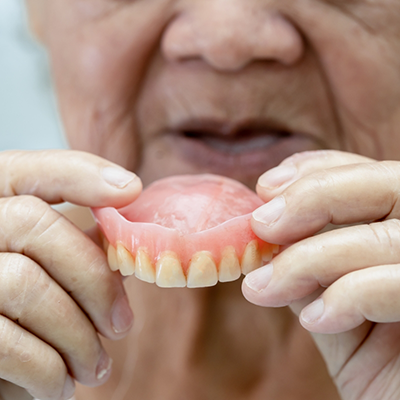
Dentures are normally recommended when you have lost several, most, or all of the teeth in your upper or lower arch. Of course, there are other possible solutions for tooth loss, so before you commit to getting dentures, we’ll examine your mouth and review your options with you. We’ll also identify any dental concerns such as tooth decay or gum disease that will need to be addressed before we begin the process of replacing your teeth.
Types of Dentures
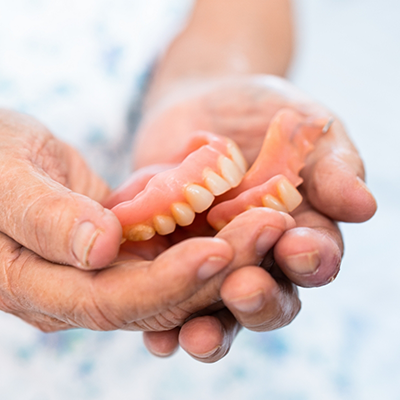
There are three main types of dentures: partial, full, and implant dentures. We’ll consider your unique needs carefully before we recommend which one is right for you.
Partial Dentures
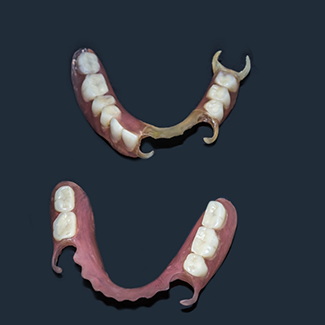
When at least one healthy natural tooth is present in the jawline, a partial denture fits in the space like a missing puzzle piece. It is retained with clasps or brackets, but it can be taken out of the mouth at any time.
Full Dentures
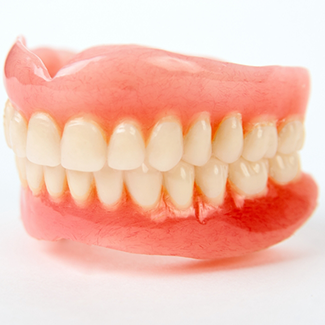
A full, or complete, denture is a prosthetic device that replaces all the missing teeth in the top or bottom of the mouth. It sits on the gums and is typically held in place with natural suction, although, you can give it additional security and stability with denture adhesive. Like partial dentures, full dentures are designed to be removable.
Implant Dentures
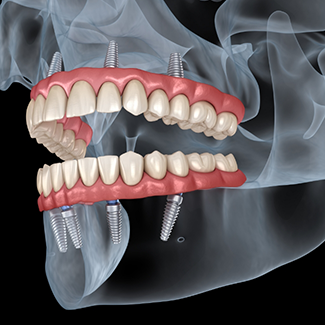
A dental implant is a small titanium cylinder that is surgically placed in your jawbone. A denture can be attached to four to six dental implant posts. Since the implants act as new tooth roots, your dentures will stay in place at all times, and they’ll have enough strength and stability to handle most foods. Since your new teeth will be permanently anchored to your mouth, you’ll be able to brush and floss them as if they were natural teeth.
The Benefits of Dentures

Why do dentures continue to be such a popular solution for people who are missing multiple teeth? The answer lies in the many benefits they provide, such as:
- Allowing you to chew a wide variety of foods without experiencing pain.
- Being a cost-effective way to replace multiple teeth simultaneously.
- Improving your ability to speak clearly.
- Having a lifespan of 10 years or more with the right maintenance.
- Being very easy to clean.
Dentures FAQs
What Is the Average Age for Dentures?
Tooth loss can happen to anyone, but it does become more prevalent among older patients. The American Dental Association took a census that found that nearly 57% of people ages 65 to 74 wear some form of denture. About 66% of adults between the ages of 40 and 64 are missing at least one tooth, compared to only 33% of adults aged 20-39. The need for replacement teeth gradually increases as you age, but people of all ages can potentially be candidates for dentures.
Will It Hurt to Get Dentures?
If you need to have teeth extracted before you can get dentures, you are likely to experience some discomfort after oral surgery. However, this can be managed by taking your over-the-counter and/or prescribed pain relievers as directed by your dentist. When you first receive new dentures, some minor irritation may occur while your mouth adjusts to the new appliance. The amount of time this discomfort lasts will vary from person to person. If discomfort persists, give us a call so we can help.
Why Do My Dentures Smell?
There are many reasons why dentures can become odorous. Bacteria can become trapped in the crevices of your dentures – especially if they aren’t fitting as well as they should. Ill-fitting dentures can irritate soft gum tissue and lead to sores and infections. Denture wearers also tend to produce less saliva to wash away food particles and bacteria that accumulate in the mouth. You can avoid bad breath by cleaning your dentures every day with a soft-bristled toothbrush and specialized cleaner. You should brush your entire mouth too, including your gums, tongue, cheeks, and palate. Soak your dentures in a disinfecting solution every night to keep them moist and reduce bacteria. Rinse your dentures after every meal to get rid of food particles and prevent bacteria accumulation.
Will Dentures Change the Shape of My Face?
When you lose your teeth, your facial muscles will begin to sag, and this can give your face a more sunken appearance. Dentures help to support the facial muscles that have collapsed, therefore improving your appearance, so it’s important to have a denture refitted or replaced as soon as you realize it isn’t fitting properly.






